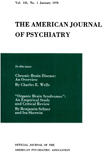DEPRESSION IN THE PSYCHOSES OF MEMBERS OF RELIGIOUS COMMUNITIES OF WOMEN
Abstract
This report is not intended to suggest that psychotic religious, or religious in general, are more depressed than other occupational or social classes, but to outline some possible reasons, specific to their life, why those who are depressed become so. Great stress is laid in religious life on hard work, high productivity, and "success" in the strictly religious and spiritual aspects of conventual life as well as in the "active" or professional works which they undertake. (The traits of the "American character" are quite faithfully mirrored in American religious communities.) In addition to these cultural influences, certain immature or poorly instructed religious are plagued by the suspicion that every failure is a sin, and for this reason their mental disturbances themselves become a circularly reinforcing cause of depression. The early onset and lengthy course of their disabling disorders, and the high rate of recurrence, further intensify their depression.
Considering the carefully structured character of religious life, it would seem that more careful selection among those who apply for permission to undertake the life, joined with precise and accurate moral and psychological instruction of those admitted could do much to reduce appreciably the abnormally depressed states among religious.
Access content
To read the fulltext, please use one of the options below to sign in or purchase access.- Personal login
- Institutional Login
- Sign in via OpenAthens
- Register for access
-
Please login/register if you wish to pair your device and check access availability.
Not a subscriber?
PsychiatryOnline subscription options offer access to the DSM-5 library, books, journals, CME, and patient resources. This all-in-one virtual library provides psychiatrists and mental health professionals with key resources for diagnosis, treatment, research, and professional development.
Need more help? PsychiatryOnline Customer Service may be reached by emailing [email protected] or by calling 800-368-5777 (in the U.S.) or 703-907-7322 (outside the U.S.).



